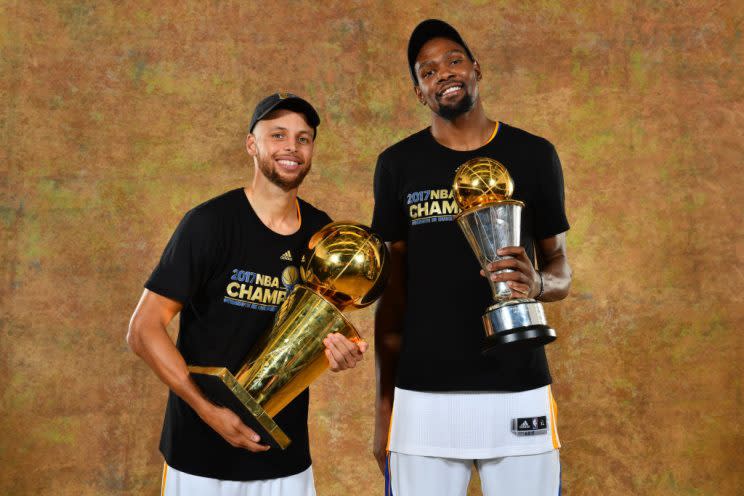Kevin Durant will take an even bigger pay cut than expected to aid Warriors

It has been established for some time now that Kevin Durant, technically the top free agent on the market for the second consecutive year, will be re-signing with the Golden State Warriors. It has also been established that, to do so, the NBA Finals MVP will take less than the maximum long-term contract for which he is eligible.
But now, three days into free agency, we have another plot twist: Durant isn’t just taking less; he’s taking less than less.
According to reports from Marcus Thompson II of Bay Area News Group and several others, Durant will soften the Warriors’ tax bill by signing a “one-plus-one” deal that pays him a 2017-18 salary of $25 million — significantly below the $31.8 million he could have made with such a deal, and almost $10 million below the $34.5 million he could have made on a long-term max deal.
The “one-plus-one” contract means Durant will have a player option worth roughly $28 million for 2018-19. Should he decline the option, he’ll be eligible for a four-year max deal that should total upwards of $160 million next summer. Should he chooses to pick up the option, he would then be eligible for a five-year super-max deal come July of 2019.
The news is directly tied to Golden State’s early activity in free agency. The Warriors re-signed both Andre Iguodala and Shaun Livingston, but paid handsomely to get the deals done. They reportedly entered free agency planning to offer Iguodala $24 million guaranteed over two years, but ultimately were forced to guarantee $48 million over three years to retain their sixth man. Livingston got a three-year, $24 million deal.
Those two contracts pushed the Warriors deep into the NBA’s luxury tax — a necessary and swallowable evil for owner Joe Lacob and his immensely popular and profitable franchise, but an evil nonetheless. Durant’s willingness to forgo money that he is certainly worth could ease the tax burden on ownership in 2017-18 by almost $20 million, according to ESPN’s Bobby Marks.
That same willingness also likely gave the team confidence to go the extra dollar in negotiations with Iguodala and Livingston. From Thompson II’s piece:
The Warriors were willing to pay [Iguodala and Livingston] that much because Durant — who has made more than $135 million in his NBA career, not counting endorsement earnings — made it clear he was willing to lower his 2017-18 salary even more. In essence, he is gifting part of his salary to his teammates.
It was also the reason the Warriors were able to re-sign Iguodala and Livingston at all in the first place. Our Dan Devine laid out the motives behind the Durant negotiations a couple weeks ago:
The step-by-step logic was laid out last week by Tim Kawakami of the Bay Area News Group. First, Durant opts out. Then, he signs a new one-plus-one deal at a 20 percent year-over-year raise, kicking his 2017-18 salary up to about $31.8 million.
That’s about $3.5 million less than the top dollar Durant could earn next year as a 10-year veteran. But as Bobby Marks of The Vertical recently detailed, signing Durant to a one-year deal using non-Bird rights could allow the Warriors to retain Andre Iguodala and Shaun Livingston, rather than having to renounce the rights to the key veteran reserves to be able to create enough cap space to accommodate a full-bore max for Durant.
The lower number for KD would allow Golden State to go over the cap to pay whatever’s necessary to bring back Iguodala, Livingston or both.
Incredibly, according to USA Today’s Sam Amick, Durant’s desire to take a pay cut wasn’t contingent on Iguodala signing. Had he bolted for Houston or San Antonio, Durant was ready to take an even larger pay cut to make room for the Warriors’ backup plan, Rudy Gay.
Durant’s unselfishness has made the Warriors’ navigation of hefty salaries and convoluted cap rules significantly easier. It also should help solidify the Warriors as the dominant force atop the NBA for years to come.



